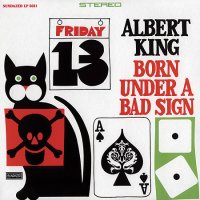Born Under a Bad Sign
| Born Under a Bad Sign | ||||
|---|---|---|---|---|
 |
||||
| Studio album by Albert King | ||||
| Released | August 1967 | |||
| Recorded | Stax Studios, Memphis Tennessee March 1966 – June 1967 |
|||
| Genre | Electric blues, soul blues | |||
| Length | 34:19 | |||
| Label | Stax | |||
| Producer | Jim Stewart | |||
| Albert King chronology | ||||
|
||||
| Professional ratings | |
|---|---|
| Review scores | |
| Source | Rating |
| Allmusic | |
Born Under a Bad Sign is the second studio album by Albert King released in 1967. The album became "one of the most popular and influential blues albums of the late '60s" and has been acknowledged by the Grammy Hall of Fame, the Blues Foundation Hall of Fame, and Rolling Stone magazine.
Born Under a Bad Sign was the first album by Albert King for Stax Records and his second album overall. It is composed of singles released by King recorded between March 3, 1966 and June 9, 1967, with additional studio tracks. Providing accompaniment to Albert King, who sang and played lead guitar, were the Stax in-house recording session band, Booker T. and the MGs, featuring the Memphis Horns.
The release of Born Under a Bad Sign in 1967 "would change the face of American music, modernizing the blues". "'It was the great divide of modern blues, the point at which the music was rescued from slipping into derivative obscurity'". Part of the album's success has been attributed to Booker T. and the MGs who "gave his blues a sleek, soulful sound [which] gave King crossover appeal". Four of the album's songs became modern blues classics: "Born Under a Bad Sign", "Oh Pretty Woman", "The Hunter", and "Crosscut Saw" (although an older song, it was given a new treatment by King). Together with "Personal Manager" and "Laundromat Blues", they "form the very foundation of Albert King's musical identity and legacy". The title track was one of the last songs by Stax to feature the imprint "Produced by Staff"; future songs were later attributed to the writers.
Albert King's guitar work on the album "directly influenced legions of guitar players who studied its every subtlety and nuance" and was "profoundly influential, not just in blues, but in rock & roll".Jimi Hendrix, Eric Clapton, and Stevie Ray Vaughan have acknowledged King's influence; indeed, some of their guitar solos are close approximations to those found on Born Under a Bad Sign.
...
Wikipedia
